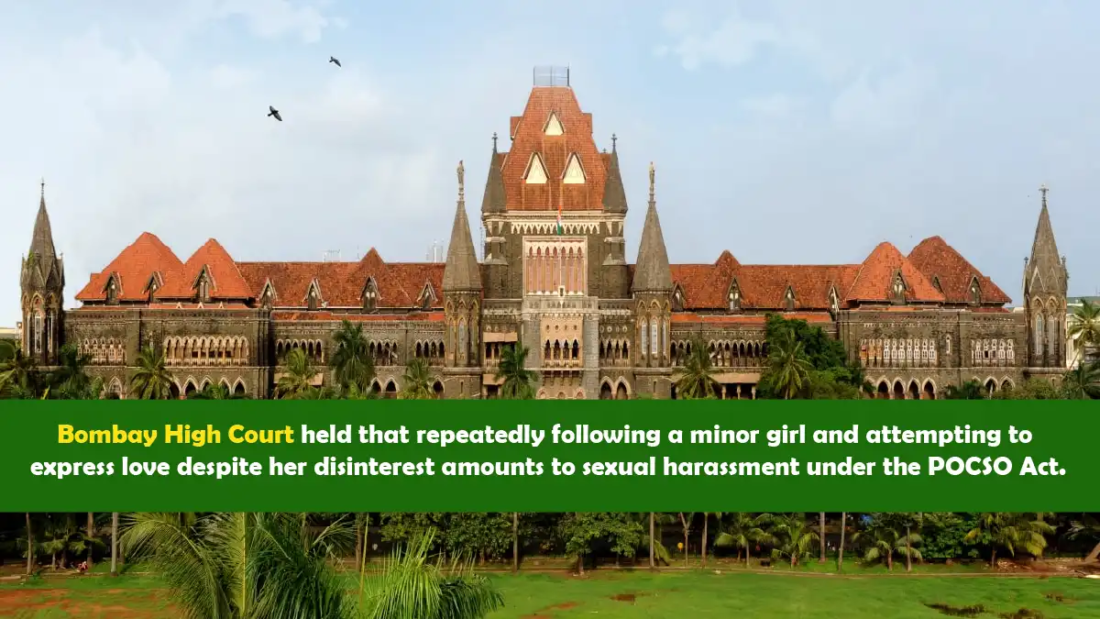Facts of the Case:
The case revolves around an incident involving a minor victim who, at the age of 13, was subjected to stalking and sexual harassment by the appellant, X. The victim reported that from July to August 2017, the appellant persistently followed her, despite her clear refusal to engage with him. On August 19, 2017, the appellant accosted the victim, grabbed her hand, and expressed his love for her, stating that she would eventually reciprocate his feelings. The victim managed to free herself and later reported the incident to her parents, leading to the registration of an FIR at the Warud Police Station. The appellant was subsequently charged under Section 354-D(1)(i) of the Indian Penal Code (IPC) for stalking and under Section 12 of the Protection of Children from Sexual Offences Act, 2012 (POCSO Act) for Sexual Harassment.
Contention of the Petitioner:
The petitioner, X, contended that the evidence presented by the prosecution was insufficient to prove the charges against him. He argued that the alleged acts of stalking were not repetitive, and that the victim’s testimony lacked credibility. The petitioner emphasized that no independent witnesses, such as the other girls who attended school with the victim, were called to corroborate her claims. Additionally, he questioned the validity of the documents presented to establish the victim’s age, asserting that the evidence was not legally admissible. The petitioner maintained that he was falsely implicated and sought to overturn the conviction.
Contention of the Respondent:
The prosecution, represented by the Additional Public Prosecutor (APP), argued that the victim’s testimony was credible and consistent, and that it sufficiently established the appellant’s guilt. The APP highlighted that the victim had no motive to falsely implicate the appellant and that the promptness of the complaint further substantiated her claims. The prosecution also provided evidence from the school admission register and the victim’s mother’s testimony to confirm the victim’s age, thus proving that she was a minor at the time of the incident. The prosecution maintained that the appellant’s actions constituted stalking and sexual harassment, as defined under the IPC and POCSO Act, respectively.
Court’s Observation:
The Court observed that the victim’s testimony was clear and consistent, with no significant contradictions or inconsistencies, even under cross-examination. The Court noted that the victim had made efforts to resist the appellant’s advances and had promptly reported the incident to her parents, which added to her credibility. The Court also found the evidence regarding the victim’s age, derived from the school records, to be reliable. The absence of independent witnesses did not, in the Court’s view, undermine the victim’s account, especially given the sensitive nature of the crime and the social stigma attached to such incidents. The Court emphasized that the victim and her family had no reason to falsely implicate the appellant, and there was no evidence of enmity between the parties.
The court noted, “The accused was repeatedly following the victim girl. He wanted to talk with her. He wanted to have love relations with her. He expressed his love for the victim and boasted that one day the victim would accept his love and say yes to him. In my view, the intention of the accused is explicit from his conduct. His intention was not good….. The evidence of the victim is sufficient to prove that the accused repeatedly followed her with an intention to foster personal interaction, despite a clear indication of disinterest by her. The evidence of the victim would further be sufficient to prove that she was subjected to sexual harassment by the accused. The offence of sexual harassment as provided under Section 11 sub-clause (vi) of the POCSO Act would squarely apply in this case”
Court’s Decision:
The Court dismissed the appeal, upholding the conviction and sentence imposed by the Sessions Judge. The Court concluded that the prosecution had successfully proven the appellant’s guilt under Section 354-D(1)(i) of the IPC and Section 12 of the POCSO Act. The Court found that the evidence on record was sufficient to establish that the appellant had engaged in stalking and sexual harassment of the victim, and that the one-year sentence of rigorous imprisonment, along with a fine of Rs.5,000, was appropriate given the circumstances. The Court saw no reason to interfere with the trial court’s judgment and order.
 Cart is empty
Cart is empty 

